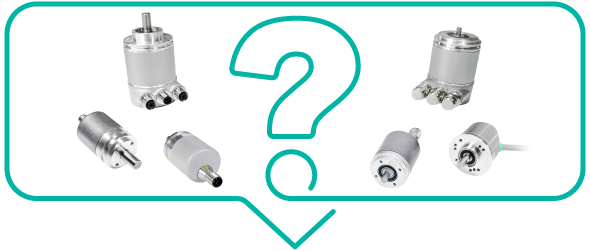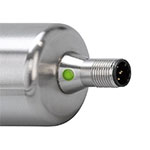
Encoder Troubleshooting & FAQ – The Complete Guide

Why is my Encoder Not Working?
Has your encoder failed during installation or operation? Has it stopped functioning and lacking any signal? If so, keep reading!
Often, we do not have time to send a sensor back for complete analysis or even time to call an expert. That is why we have compiled some expert troubleshooting tips to get your encoder back up and running.
Common Encoder Failures
It is likely that the challenge(s) you are facing have already been encountered and solved. For all our interfaces, we keep dedicated, up to date FAQs and instructions, which can be found down below:
| Interface | FAQ | Operating Instructions | Quickstart Instructions |
|---|---|---|---|
| Accessory-UBIFAST Tool | PDF
(EN) PDF (CN) | ||
| Accessory-SSI2USB | PDF
(EN) PDF (CN) | ||
| Analog | VIEW | PDF
(EN) PDF (CN) | |
| CANopen (Magnetic) | VIEW | VIEW | PDF
(EN) PDF (CN) |
| CANopen (Optical) | VIEW | VIEW | PDF
(EN) PDF (CN) |
| CANopen (Redundant) | VIEW | VIEW | PDF
(EN) PDF (CN) |
| DeviceNet | VIEW | ||
| EtherCAT | VIEW | VIEW | PDF
(EN) PDF (CN) |
| EtherNet/IP | VIEW | VIEW | PDF
(EN) PDF (CN) |
| Inclinometer - Analog | VIEW | PDF
(EN) PDF (CN) | |
| IO-Link | VIEW | PDF
(EN) PDF (CN) | |
| IO-Link + Incr | VIEW | ||
| Modbus RTU | VIEW | PDF
(EN) PDF (CN) | |
| Modbus TCP/IP | VIEW | VIEW | PDF
(EN) PDF (CN) |
| Powerlink | VIEW | ||
| Profibus | VIEW | VIEW | PDF
(EN) PDF (CN) |
| Profinet | VIEW | VIEW | PDF
(EN) PDF (CN) |
| PROFIsafe | VIEW | VIEW | PDF
(EN) PDF (CN) |
| SAE J1939 | VIEW |
LED: Self-Diagnosed Encoder Failure

Some of our sensors present diagnostic LEDs on the back of their connection cap or connector. They provide information regarding the device status. Check out what the blinking pattern means to understand the origin of the error.
Encoder Failure: Finding the Root-Cause
An encoder is made up of several components that could cause a failure; therefore the origin of the problem may be harder to guess. Please find here below a systematic approach designed to help you work out which part of the encoder might be faulty.
1. Encoder Mechanical Failure
| Test | Result | Interpretation |
|---|---|---|
| Inspect the device for external signs of damage | No obvious sign of damage | N.A |
| Clear traces of damage | This is most likely the issue | |
Can the shaft be manually moved? |
Yes, without applying to much torque | N.A |
| The encoder shaft cannot be moved or with high torque | Send the encoder back for analysis (RMA Process). |
2. Encoder Power Supply Failure
| Test | Result | Interpretation/Action |
|---|---|---|
| Measure voltage and current on your power supply | Within the values specified on the product datasheet | N.A |
| Voltage and/or current lower than expected | Adjust the power supply | |
| Voltage and/or current higher than specified values | The encoder is probably damaged | |
| Measure voltage and current on the device connector | Same as measured on the power supply | N.A |
| Voltage and/or current on the encoder different from the power supply | Change the cable between them,it should solve the problem | |
| Check the encoder LEDs | LED are blinking or standing still | Power gets to the encoder |
| No LED visible | No power on the encoder. Send the encoder back for analysis (RMA Process). |
3. Encoder Connection Issues
| Test | Result | Interpretation/Action |
|---|---|---|
| Try to ping the encoder | The encoder can be pinged | The encoder is connected to the network |
| The encoder cannot be pinged | The encoder cannot be found on the network. Check physical communication medium and configuration. | |
| Compare the actual pin assignment against the datasheet | The pin assignment is as expected | N.A |
| The pins were wrongly assigned | Correct the pin assignment, perform a power cycle, and see if the device now works | |
| Try Another Product | The replacement device works | The original sensor is probably damaged |
| The replacement device does not work |
The problem most likely comes from another part of the system |
4. Incorrect Output Data
| Test | Result | Interpretation/Action |
|---|---|---|
| Check the coupling with the moving part | Coupling correctly tightened | N.A |
| Coupling was too loose | Tighten the coupling and test the output data again | |
| Compare the actual resolution against the expected one | They are the same | N.A |
| The encoder resolution is different from the expected one | Adjust the resolution so it fits the expected one and test the output data again | |
| Check the pin assignment | See section here above |
5. Configuration
| Parameter | Common Failures | Interpretation/Action |
|---|---|---|
| IP address / Node ID | Check if the IP address or Node ID on the encoder is the same as configured on the network | Find your IP addresses: POSITAL IP Configuration Tool |
| Duplicates | It can happen that some IP addresses, Node ID or Device Names appear twice on the network | Make sure the device does not have duplicates on the network |
| DHCP/BOOTP | This parameter can prevent the software from seeing the IP address | Perform test: Enable or Disable DHCP/BOOTP |
